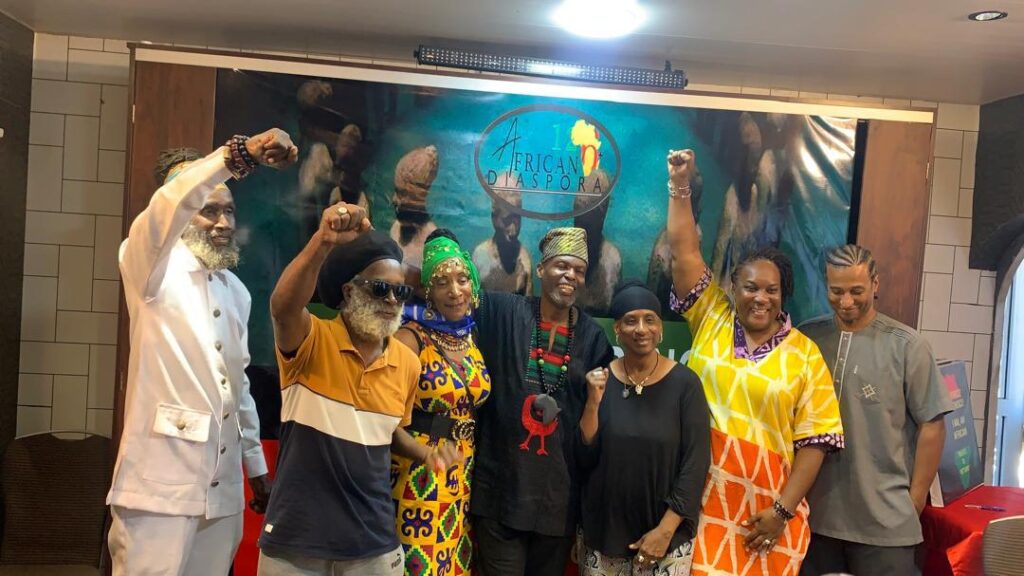…African Diaspora Community to Interior Minister
By Philip Antoh
A group known as the African Diaspora 126+, has appealed to the Interior Minister, Alhaji Muntaka Mohammed Mubarack, to clarify a statement made on April 3, 2025, that the government of Ghana has planned to commercialize residency permit for foreigners in Ghana.
According to the group also known as the Historically Unique Group (HUG), the minister’s statement lack clarity and want him to come clear of their status in Ghana, while demanding clear cut policy to regulate their stay.
Residency permits
Speaking at a press conference in Accra on April 22, 2025, the Chairman of the African Diaspora 126+, Yaw Owusu Akyeaw, said, “While we recognize the right of every sovereign nation to establish its own immigration policies, we believe this policy, as announced, lacks the necessary nuance and sensitivity required to acknowledge a group of people whose relationship with Ghana is not one of opportunism, but of origin, displacement, and return.”
Mr Akyeaw, maintained that they are not ordinary migrants but rather descendants of enslaved Africans who were dispersed by force and returning by choice.
“Our movement back to Ghana is driven by historical injustice and generational healing, not economic migration. The idea that we should be lumped together under a foreign category and asked to pay for the right to return home is deeply painful and unacceptable,” he stated.
He indicated that what “we need now is recognition and not commodification our families were taken from these shores generations ago. We return not as foreigners, but as sons and daughters of the soil, seeking reconnection, not relocation.”
“It is disheartening to hear policy framed in terms of revenue-generation without any recognition of the unique history, trauma, and significance that characterizes the return of Africa’s Diaspora.”
This policy proposal, he said risks undermining the international goodwill generated by Ghana’s Year of Return and Beyond the Return initiatives adding that those efforts were seen globally as bold affirmations that Ghana was prepared to lead the continent in reconciling with its Diaspora. What signal does his new proposal send?
Our position
HUG is, therefore calling on the government of Ghana and the Ministry of the Interior, to distinguish between returnees and foreign nationals in all matters relating to immigration, permits, and national policy, engage in direct consultation with verified diaspora groups – especially those with lineage connected to the trans-Atlantic slave trade before finalising any policy that impacts our right to reside, work, or reintegrate in Ghana.
Again, they are calling for a clear and accessible path to legal residency and citizenship that reflects the historic and spiritual relationship with Ghana, without commodifying our identity and also ensure transparency and accountability in the residence permit process.
He revealed that many returnees have faced irregular requirements, unpredictable fees, shifting bureaucratic demands. A humane, standardized process is overdue.
“We are not opposed to Ghana’s efforts to strengthen its institutions, generate revenue, or secure its borders. However, this must not come at the expense of those returning in good faith to rebuild what was stolen from us.”
Mr Akyeaw, indicated that HUG is not asking for handouts but rather, asking for justice, recognition, and an honest commitment to the spirit of Pan-Africanism that Ghana, has long claimed to champion.
He indicated that this moment calls for vision not transactional policy. Ghana has the opportunity to lead with empathy, history, and integrity.
“Let us not reduce the sacred journey of return to a bureaucratic transaction,” indicated.
On her part, Taofikat Joof, said the minster asking for an initial $250,000 investment package and yearly fee of $200,000 is too huge for African Diasporians who are merely pensioneers trying to locate their origin.
She again said if the government does not consider its position on the matter, it will discourage other African Diasporans and the younger generation who we are trying to convince to come home.

